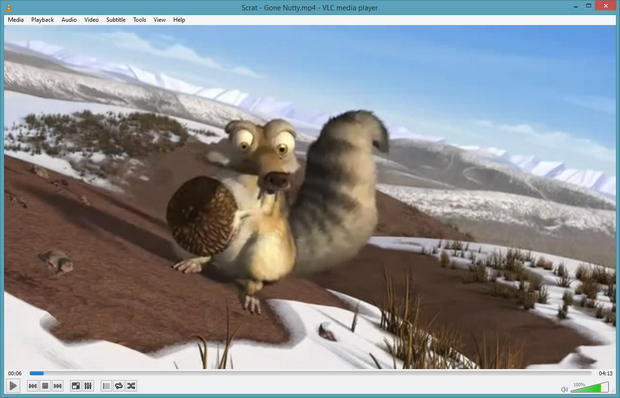 De eerste release candidate van versie 2.1.0 van VLC Media Player is verschenen. Deze opensource- en cross-platformmediaspeler kan diverse audio-, video- en streamingformaten afspelen, zonder dat hiervoor de desbetreffende codec hoeft te worden geïnstalleerd. Er is ook een versie voor Windows. De broncode moet het programma ook bruikbaar maken voor besturingssystemen als Linux, BSD en Solaris. Een versie voor Android is in ontwikkeling.
De eerste release candidate van versie 2.1.0 van VLC Media Player is verschenen. Deze opensource- en cross-platformmediaspeler kan diverse audio-, video- en streamingformaten afspelen, zonder dat hiervoor de desbetreffende codec hoeft te worden geïnstalleerd. Er is ook een versie voor Windows. De broncode moet het programma ook bruikbaar maken voor besturingssystemen als Linux, BSD en Solaris. Een versie voor Android is in ontwikkeling.
In versie 2.1.0, die met RinceWind net als de vorige versie naar een karakter uit de Discworld-boeken van Terry Pratchett is vernoemd, is onder meer werk gestoken in het verbeteren van de geluidsweergave en het afspelen van nieuwe en oude niet-standaard bestandsformaten. Verder zien we de terugkeer van de iOS-versie en gaat het programma ook voor WindowsRT verschijnen. De bèta is vooralsnog alleen voor Windows en OS X te downloaden.
Highlights:
- Port of the VLC engine to Mobile OS, including Android, iOS (again), WinRT. This denotes new audio and video outputs, OpenGL ES improvements, including shaders; but also work on the hardware decoding for mobile.
- A new audio core, including rewrite of most audio output modules. This improves the stability, reactivity (no more volume change lag), volume control (logarithmic), performance, precision (up to 384kHz).
- An important work on correct playback of new formats and old non-standard files, fixing most of the small regressions on rare formats that we've seen in the 2.0.x branch. New codecs have been added, including G2M4, MSS1/2, SCTE-27, Real Lossless or Ulead DV Audio
- New protocols and input support have been added like Smooth Streaming, improved MPEG-DASH, improved Blu-Ray; but also a new VNC support and an AVCapture module for OSX.
- Hardware decoders (Mac OS X, Android) and encoders (Intel QuickSync Video) were also added in this release, to focus on performance.
- The OS X interface has seen a lot of polishing and fixes, which finishes the work started in 2.0.0 to renew the interface.
- For developers, libVLC and most libVLC modules are now licensed under the LGPL, a copyleft license that should allow more flexibility for application developers.
- For web developers, the webplugin has been partially rewritten and now support windowless, allowing CSS transform like 3D and overlaying objects above the video, like Flash does.


:fill(white):strip_exif()/i/2006758682.jpeg?f=thumbmedium)